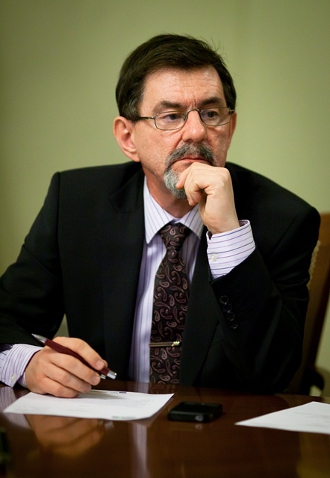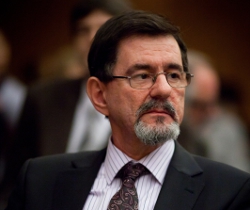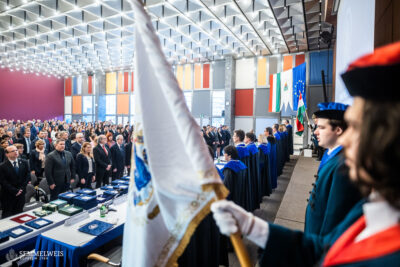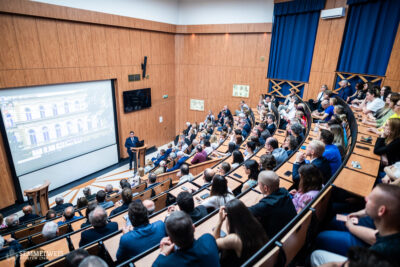The handover/takeover process commenced on May 31, the Senate said its farewells to former rector Tivadar Tulassay and so, on June 1, Dr. Ágoston Szél took his seat as the new head of Semmelweis University. In an interview given to the University website, Dr. Ágoston Szél recalled that the two keywords of his rectoral application had been stability and cooperation, noting that these concepts may be even more pertinent today than when the application was submitted.

Relating to cooperation and the significant reserves which lie within it, Rector Szél said he considers it important to realise that the University does not stand alone, but is rather built out of its faculties. As he had noted prior to his hearing before the Senate, “the six faculties naturally have to work together and support one another. They must recognise those areas where the activities of the faculties complement each other in such a way as to make joint applications and the launching of joint scientific projects and training programmes feasible and desirable.”
Rector Szél stressed that he is counting particularly on the assistance of the faculty deans, who will be involved in strategic decisions. The new rector explained that separate meetings of the deans are projected to take place in the future, where current issues may be examined and discussed together.
Speaking of the immediate and urgent tasks at hand, Dr. Szél highlighted the institutional development plan, the preparation deadline of which is June 30. In effect, it is upon this document that the state decision of which funding category to place each university into is based. Significantly, the question of whether Semmelweis University will be able to hold onto its “Research University” title – an extremely important priority – may ultimately depend on this.
The University’s stability and unity must be given a prioritised role, which is why Dr. Szél considers it important, in accordance with the previous practice, for the University’s rector to preside as head of the Clinical Centre. However, the current organisational and operational regulations distinguish between clinician and non-clinician rectors in this respect. The legal consolidation needed to lift this requirement is expected to conclude by the end of June. Until then, Dr. Ágoston Szél has issued a rectoral order, which states that, by virtue of his authority, he shall, as rector, perform the tasks of the Clinical Centre, with adequate professional support. In managing the Clinical Centre, the rector will also rely upon the leaders of those faculties which have clinical departments (Dentistry, Medicine), as well as the Faculty of Pharmaceutical Sciences.
The new rector mentioned that he has asked three outstanding and reputable experts to submit applications for the advertised vice-rectoral posts: Dr. László Hunyady (director of the Department of Physiology) for the position of vice-rector for General and Educational Affairs, Dr. János Gál (director of the Department of Anaesthesiology and Intensive Therapy) for the position of vice-rector for Clinical Affairs and Dr. Mária Judit Molnár (head of the Molecular Neurology Centre, Department of Neurology) for the position of vice-rector for Scientific Affairs.

It is clear from Dr. Szél’s rectoral application that he considers cooperation to be of utmost importance in the area of research as well; he wrote, among other things that, through the “Research University” title and over the course of carrying out the associated complex research programme, it became apparent that the relatively large number of fragmented research groups could conduct international-quality research much more efficiently if they would work in a coordinated fashion, connected to a larger, well-defined University research network. Rector Szél views the implementation of cross-faculty research networks and setting grant objectives above the faculty level as suitable means to achieve this goal. The new concept for higher education and the proper exploitation of related grant opportunities will enable further collaborations overarching universities and connecting regions and scientific disciplines.
The rector considers the Hungarian and foreign language educational programmes, which provide the University with great visibility and reputation within the nation and abroad, to be of especial importance. Dr. Szél stated that, in the interest of maintaining the quality of education and serving student interests and expectations in the most efficient way possible, he wishes to place great emphasis on regular exchange of views with students on general and specific student-related issues alike.
The University Senate voted unanimously in favour of accepting Dr. Ágoston Szél’s rectoral application and for his election as rector at its March 29 session. The new rector was set to take office on July 1 but, as is known, Dr. Tivadar Tulassay resigned from his post as rector on April 1, three months before the end of his mandate. The Minister did not accept his resignation stating that, using an opportunity provided by the law, he requires Dr. Tulassay to fill his leadership position until May 31.
The next month will be a sort of transitory period; until his ceremonial inauguration on June 29, Dr. Ágoston Szél’s official position will be elected and acting rector though, as of June 1, he carries out the rectoral tasks as the fully authorized head of the University.
In an earlier interview, Dr. Ágoston Szél had referred to himself as a renaissance man, in the classical sense, who is proud of his humanism and love of mankind. Humility toward students, patients and colleagues plays a central role in his value system. Rector Szél has said that, although he will naturally have to make many decisions as rector, he will – without giving up the sanctity of the goal – seek to reduce conflict and avoid the violation of interests. “Humanism must radiate from a leader’s mentality; a leader is authentic if everyone feels that he is acting in the interests of the community, the students and the patients.”
Pálma Dobozi
Translated by Gina Gönczi


